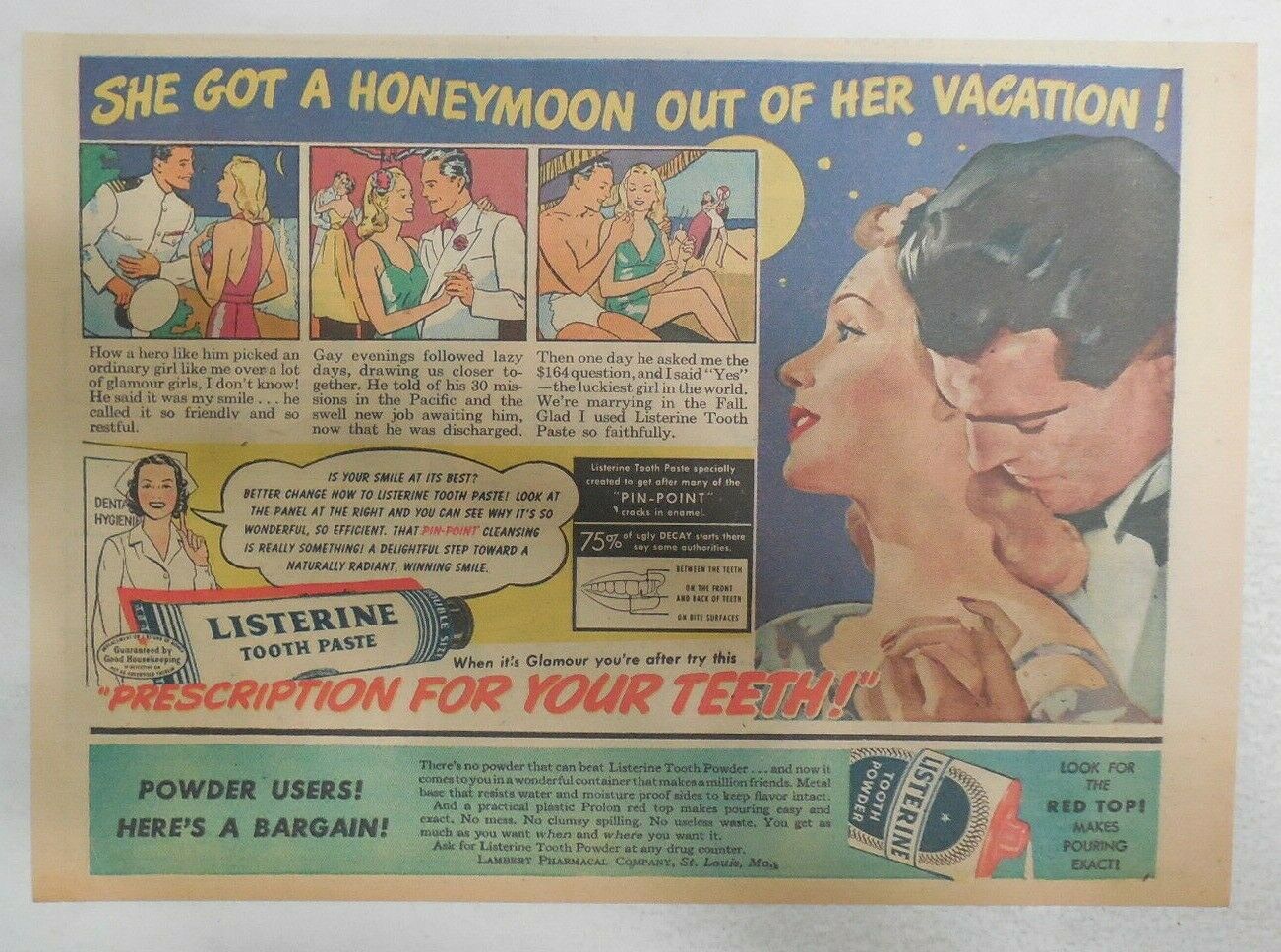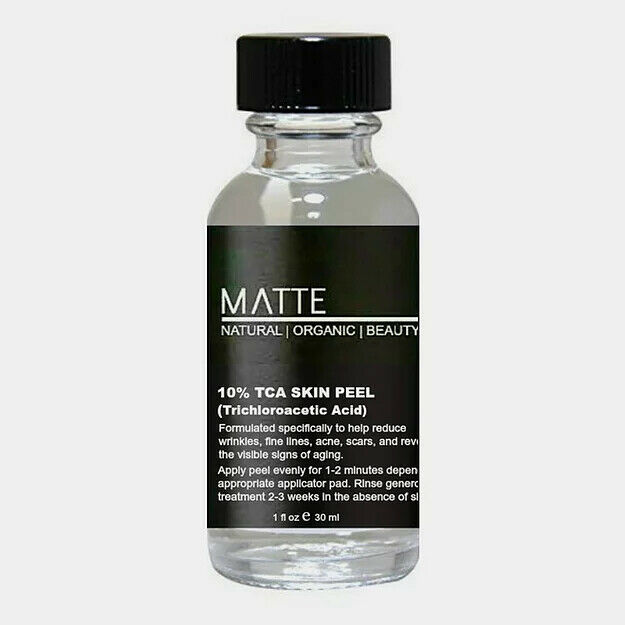-40%
Listerine Toothpaste Ad: Honeymoon From Vacation ! from 1940's 7.5 x 10 inch
$ 5.28
- Description
- Size Guide
Description
This is aListerine Toothpaste Ad
.
Hard to Find Early Pages!
Great Artwork!
This
was cut from the original newspaper Sunday comics section of
1930's -1940's.
Size
: ~7.5 x 10 inches (Half Tabloid Page).
Paper
: Some light tanning/wear, otherwise: Excellent! Bright Colors!
Pulled from loose sections!
(Please Check Scans)
Free Postage USA
!
.00
Total
International
postage on any size order
Flat Rate
.
I combine postage on multiple pages
. Check out my other auctions for more great vintage Comic strips and Paper Dolls.
Thanks for Looking!
*Fantastic Pages for Display and Framing!
Listerine
Product type
Mouthwash, toothpaste, fluoride rinse, quick-dissolving strips, breath spray,dental floss
Owner
McNeil Consumer Healthcare division of Johnson & Johnson
Country
US
Introduced
1879
Related brands
Plax
Previous owners
Lambert Pharmacal Company
Warner-Lambert
Pfizer
Tagline
"Kills germs that cause bad breath"
"Power to Your Mouth"
Listerine is a brand of antiseptic mouthwash product. It is promoted with the slogan "Kills germs that cause bad breath". Named after Joseph Lister, 1st Baron Lister, a pioneer of antiseptic surgery, Listerine was actually developed in 1879 by Joseph Lawrence, a chemist in St. Louis, Missouri.
Originally marketed by the Lambert Pharmacal Company (which later became Warner-Lambert), Listerine has been manufactured and distributed by Johnson & Johnson since that company's acquisition of Pfizer's consumer healthcare division in late December 2006.
The Listerine brand name is also used in toothpaste, Listerine Whitening rinse, Listerine Fluoride rinse (Listerine Tooth Defense), Listerine SmartRinse (children's fluoride rinse), PocketPaks, and PocketMist. In September 2007, Listerine began selling its own brand of self-dissolving teeth-whitening strips.
History
Inspired by Louis Pasteur's ideas on microbial infection, the English doctor Joseph Lister demonstrated in 1865 that use of carbolic acid on surgical dressings would significantly reduce rates of post-surgical infection. Lister's work in turn inspired American Joseph Lawrence to develop an alcohol-based formula for a surgical antiseptic which includedeucalyptol, menthol, methyl salicylate, and thymol. (Its exact composition was a trade secret.) Joseph Lawrence named his antiseptic "Listerine" in honor of Joseph Lister.
Lawrence hoped to promote Listerine's use as a general germicide as well as a surgical antiseptic, and licensed his formula to a local pharmacist named Jordan Wheat Lambert in 1881. Lambert subsequently started the Lambert Pharmacal Company, marketing Listerine. Listerine was promoted to dentists for oral care in 1895 and was the first over-the-counter mouthwash sold in the United States, in 1914. It became widely known and entered common household use after Jordan Wheat Lambert's son Gerard Lambert joined the company and promoted an aggressive marketing campaign.
According to Freakonomics:
Listerine, for instance, was invented in the nineteenth century as powerful surgical antiseptic. It was later sold, in distilled form, as both a floor cleaner and a cure for gonorrhea. But it wasn't a runaway success until the 1920s, when it was pitched as a solution for "chronic halitosis"— a then obscure medical term for bad breath. Listerine's new ads featured forlorn young women and men, eager for marriage but turned off by their mate's rotten breath. "Can I be happy with him in spite of that?" one maiden asked herself. Until that time, bad breath was not conventionally considered such a catastrophe. But Listerine changed that. As the advertising scholar James B. Twitchell writes, "Listerine did not make mouthwash as much as it made halitosis." In just seven years, the company's revenues rose from 5,000 to more than million.
In 1955, Lambert Pharmacal merged with New York-based Warner-Hudnut and became Warner-Lambert Pharmaceutical Company and incorporated in Delaware with its corporate headquarters in Morris Plains, New Jersey. In 2000, Pfizer acquired Warner-Lambert. Among Lambert's assets was the original land for Lambert-St. Louis International Airport.
From 1921 until the mid-1970s, Listerine was also marketed as preventive and remedy for colds and sore throats. In 1976, the Federal Trade Commission ruled that these claims were misleading, and that Listerine had "no efficacy" at either preventing or alleviating the symptoms of sore throats and colds. Warner-Lambert was ordered to stop making the claims, and to include in the next .2 million worth of Listerine ads specific mention that "Listerine will not help prevent colds or sore throats or lessen their severity." The advertisement run by Listerine added the preamble "contrary to prior advertising".
For a short time, beginning in 1927, the Lambert Pharmaceutical Company marketed Listerine Cigarettes.
From the 1930s into the 1950s, advertisements claimed that applying Listerine to the scalp could prevent "infectious dandruff".
Listerine was packaged in a glass bottle inside a corrugated cardboard tube for nearly 80 years before the first revamps were made to the brand; in 1992, Cool Mint Listerine was introduced in addition to the original Listerine Antiseptic formula and, in 1994, both brands were introduced in plastic bottles for the first time. In 1995, FreshBurst was added, then in 2003 Natural Citrus. In 2006 a new addition to the "less intense" variety, Vanilla Mint, was released. Nine different kinds of Listerine are on the market in the U.S. and elsewhere: Original, Cool Mint, FreshBurst, Natural Citrus, Naturals, Vanilla Mint, UltraClean (formerly Advanced Listerine), Tooth Defense (mint shield), and Whitening pre-brush rinse (clean mint).
Composition
The active ingredients listed on Listerine bottles are essential oils which are menthol 0.042%, thymol 0.064%, methyl salicylate 0.06%, and eucalyptol 0.092%. In combination all have an antiseptic effect and there is some thought that methyl salicylate may have an anti inflammatory effect as well. Ethanol, which is toxic to bacteria at concentrations of 40%, is present in concentrations of 21.6% in the flavored product and 26.9% in the original gold Listerine Antiseptic. At this concentration, the ethanol serves to dissolve the active ingredients.
The addition of the active ingredients means the ethanol is considered to be undrinkable, known as Denatured Alcohol, and it is therefore not regulated as an alcoholic beverage in the United States. (Specially Denatured Alcohol Formula 38-B, specified in Title 27, Code of Federal Regulations, Part 21, Subpart D)
Safety
There has been concern that the use of alcohol-containing mouthwash such as Listerine may increase the risk of developing oral cancer.[[As of 2010, 7 meta analyses have found no connection between alcohol-containing mouthwashes and oral cancer, and 3 have found increased risk. In January 2009, Andrew Penman, chief executive of The Cancer Council New South Wales, called for further research on the matter.[20] In a March 2009 brief, the American Dental Association said "the available evidence does not support a connection between oral cancer and alcohol-containing mouthrinse".
In 2009, Johnson and Johnson launched a new alcohol-free version of the product called Listerine Zero.
On April 11, 2007, McNeil-PPC disclosed that there were potentially contaminants in all Listerine Agent Cool Blue products sold since its launch in 2006, and that all bottles were being recalled. The recall affected some 4,000,000 bottles sold since that time. According to the company, Listerine Agent Cool Blue is the only product affected by the contamination and no other products in the Listerine family were under recall.
*
Please note
: collecting and selling comics has been my hobby for over 30 years.
Due to the hours of my job I can usually only mail packages out on Saturdays.
I send out
First Class or Priority Mail which takes 2 - 10 days
to arrive
in
the USA and
Air Mail International which takes 5 - 30 days or more depending on where you live in the world
.
I do not "sell" postage or packaging and charge less than the actual cost of mailing. I package items securely and wrap well.
Most pages come in an Archival Sleeve with Acid Free Backing Board
at no extra charge
. If you are dissatisfied with an item. Let me know and I will do my best to make it right.
Many Thanks to all of my 1,000's of past customers around the World.
Enjoy Your Hobby Everyone and Have Fun Collecting!









